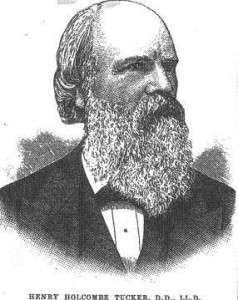 Henry Holcombe Tucker, Mercer University professor and pastor at Bethesda Baptist Church in Greene County, approaches his congregation with a “if it comes to this” notification as the church meets in monthly conference. From the church’s minutes, as recorded by Clerk William A. Overton, a former Mercer student:
Henry Holcombe Tucker, Mercer University professor and pastor at Bethesda Baptist Church in Greene County, approaches his congregation with a “if it comes to this” notification as the church meets in monthly conference. From the church’s minutes, as recorded by Clerk William A. Overton, a former Mercer student:
The Pastor called the Conference, to which he made the following statement: That whilst he had no desire neither did he expect to leave this church, yet in the Exigencies of war, he might be compelled; and as the contract was that when he accepted the pastoral care of the church, that when either party wished the connection to cease, such party wishing it was to give the other party six months notice. He therefore made the statement now so that if he should have to leave, he might not be considered as not having complied with his part of the contract. There was no action taken Conference adjourned.
As it turns out Tucker is never whisked away for Confederate service.
William Overton, however, spends some time imprisoned by federal troops, a thought which surely never crosses his mind in fall 1861 as he met faithfully with his church and wrote down the meager minutes of their ecclesiastical assemblies. His role as clerk, which began with the minutes of 14 October 1854, ends after he pens the minutes of 17 May 1862.
At some point “early” in the war, schoolteacher Overton is chosen superintendent of the Georgia Salt Manufacturing Company. He devoted himself to that work according to Baptist historian Samuel Boykin, who said Overton developed a salt works on the Atlantic Ocean in southeast Georgia after being overrun by federal armies at a similar operation in southwest Virginia. “In a few weeks the white-salt-stream began to pour into middle and upper Georgia,” wrote Boykin. “At this juncture, having learned that the Union army had retired from the Virginia salt-works, he went back to that place and prosecuted his work with success. He sent vast quantities of salt out of that far-off valley through the Carolinas into Georgia. On one occasion he sent 6,600 bushels of salt at one trip.”
After a while Overton returns to the coast near Savannah. There he learns federal soldiers have captured or driven away his employees. Overton is not daunted. “Without a moment’s hesitation,” said Boykin, “he moved on as far as he could go by railroad, and then he trudged alone beyond the Confederate lines, for twenty-three miles, at the dead hour of night, until he reached the dreary, desolate and deserted works. He found that the enemy had re-embarked on board their boats; so the salt men were soon rallied and the work of making salt was resumed and vigorously continued.”
Until, that is, enemy soldiers in large force return, capturing him and the workers. All are confined in the hold of a prison ship at sea, ending Overton’s career as a salt maker.
Overton and Tucker’s lives, however, remain connected. Through the years the professor and future Mercer president had counseled Overton as he struggled with hearing the call of God to preach. Back in Greene County, Overton soon enough encounters Tucker who immediately asks, “What did you promise the Lord, if he would return you safe again to your home and family?” Recounting his “Jonah-like” encounter in the watery deep, Overton admitted to promising that were he spared and “liberty secured” he would indeed make preaching a life vocation. Soon after that promise he was paroled and returned to his friends on Sullivan’s Island. Tucker soon has Overton ready for ordination with himself and the renowned Dr. William T. Brantly of Baltimore as presbytery.
Overton pastors a number of churches in the coming years including Shiloh, Penfield, and Bethesda in Greene County.
Sources: Conference Minutes of Bethesda Baptist Church Union Point (Greene County) Georgia August 1816 to December 1865, transcribed and indexed by Vivian Toole Cates, 1991, page 237; Samuel Boykin, History of the Baptist Denomination in Georgia, 1881, pages 408-409.
Story written by Arlette Copeland, Special Collections Assistant, Jack Tarver Library Special Collections, Mercer University, Macon, GA


